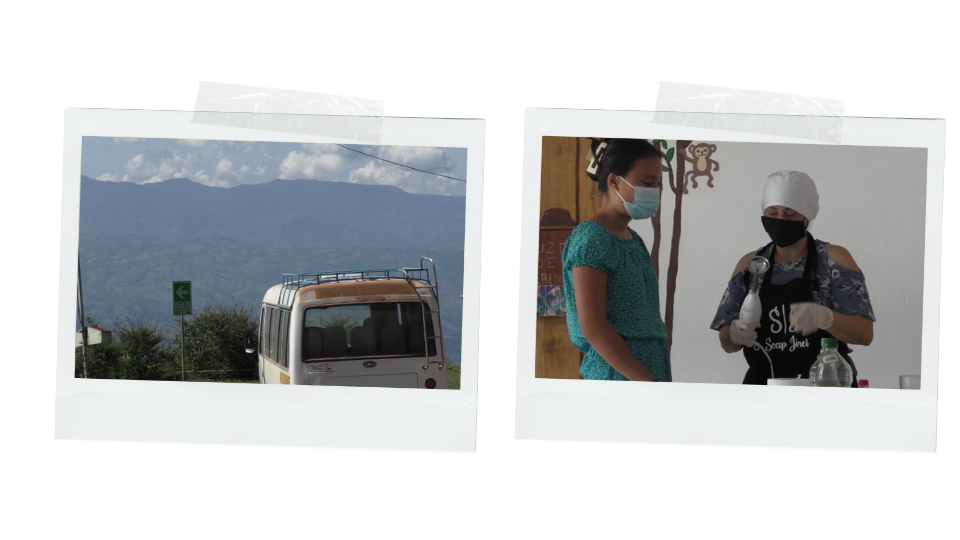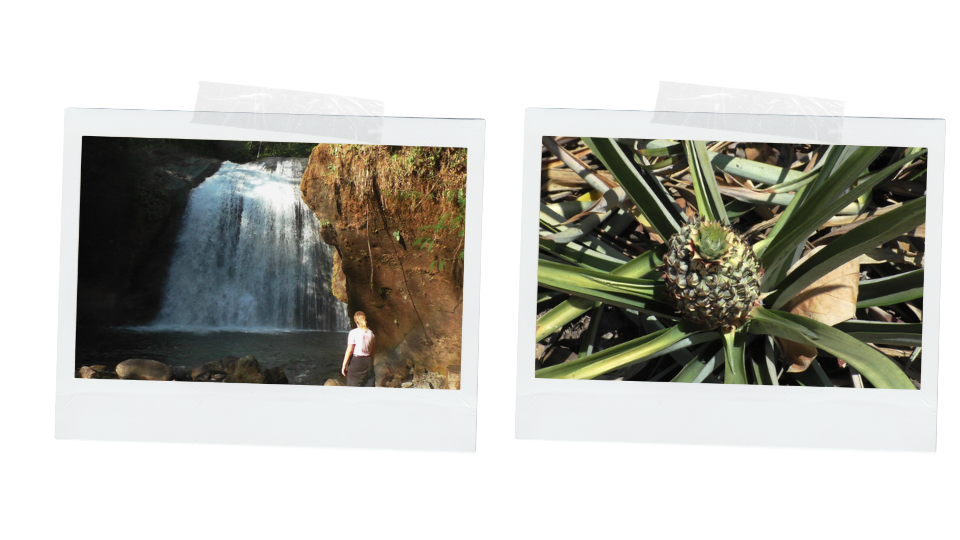Community-Centered Change
 On this latest excursion, we stayed with ASOMOBI at their lodge in Biolley. This excursion was very informative. We primarily learned how much ASOMOBI has revived the local economy. They are a group of women involved in tourism and coffee production in the area, and they have, in many ways, single-handedly constructed an eco-tourism-focused community around Park La Amistad.
On this latest excursion, we stayed with ASOMOBI at their lodge in Biolley. This excursion was very informative. We primarily learned how much ASOMOBI has revived the local economy. They are a group of women involved in tourism and coffee production in the area, and they have, in many ways, single-handedly constructed an eco-tourism-focused community around Park La Amistad.
Their foundation is based on the idea of a circular economy–they’re not generating enormous amounts of money, but what they make from their tours and their artisanal coffee production goes back to their local employees, which then goes back into the economy. Also, all the additional things tourists need get redirected to local community members.
There’s a huge contrast to this, which also exists in this same community. The pineapple farms, or piñeras, are owned by a huge company from the United States. These farms are huge monocultures, and they stretch for miles. The companies that own them spread about 18 kilos of chemical pesticides to every hectare, not to mention the amount of chemicals that go into the soil to make it fertile enough to plant pineapples. These chemicals get in nearby water sources, making the local water undrinkable. Not only that, but the local workers are paid dismally for the amount of work they do, and often suffer incredibly difficult conditions.
 These two organizations are incredibly different. The pineapple farms are extractive to the community–they take all the resources of the community, which consist of labor, water, and land, and the community gets very little in return. In contrast, with the circular community model of ASOMOBI, all the people involved in the community get benefits because of the work that ASOMOBI does. Their work doesn’t extract resources, but rather continues building them, and benefits from having a stronger community in which more people are paid well for their jobs. These pineapple companies are there because of the demand from the United States and Europe, and often, people in those countries can buy their products at a lower price than Costa Ricans can.
These two organizations are incredibly different. The pineapple farms are extractive to the community–they take all the resources of the community, which consist of labor, water, and land, and the community gets very little in return. In contrast, with the circular community model of ASOMOBI, all the people involved in the community get benefits because of the work that ASOMOBI does. Their work doesn’t extract resources, but rather continues building them, and benefits from having a stronger community in which more people are paid well for their jobs. These pineapple companies are there because of the demand from the United States and Europe, and often, people in those countries can buy their products at a lower price than Costa Ricans can.
This also shows the importance of having community-built organizations. Too often, when foreign charities come in, they impose activities on others which are not generated by the community. Therefore, if or when they leave, there is no real community infrastructure that supports the benefits to the community. In contrast, ASOMOBI has funded dozens of community initiatives around sustainable businesses, successfully creating eco-tourism attractions for the tourists in the area, and is working locally with the national park to share the responsibility for one of the trails. Not only does this employment benefit the community, but it also ensures lasting and sustainable changes to how the community does things.
ASOMOBI’s community-centered change has provided their rural community with income and opportunities for the local children, which were previously unthinkable. They have been able to reconstruct the school, and have incorporated sustainability into all education. This community is a beacon for what is possible when communities are motivated and are given the resources for large-scale change. Not only that, but I think this excursion has helped me have a lot more awareness about the kind of life I lived in the US, and how many things were immediately available to me, as well as the consequences of some of those products. Sustainability is the work of an entire generation, of the entire world. ASOMOBI is taking on that work, and it’s only fair that we contribute to it.
Cambio centrado en la comunidad
 En esta última excursión, nos alojamos con ASOMOBI en su albergue de Biolley. Esta excursión fue muy instructiva. Sobre todo aprendimos lo mucho que ASOMOBI ha revitalizado la economía local. Se trata de un grupo de mujeres que se dedican al turismo y a la producción de café en la zona y que, en muchos sentidos, han construido por sí solas una comunidad centrada en el ecoturismo en torno al Parque La Amistad.
En esta última excursión, nos alojamos con ASOMOBI en su albergue de Biolley. Esta excursión fue muy instructiva. Sobre todo aprendimos lo mucho que ASOMOBI ha revitalizado la economía local. Se trata de un grupo de mujeres que se dedican al turismo y a la producción de café en la zona y que, en muchos sentidos, han construido por sí solas una comunidad centrada en el ecoturismo en torno al Parque La Amistad.
Su fundación se basa en la idea de una economía circular: no generan enormes cantidades de dinero, pero lo que ganan con sus excursiones y su producción artesanal de café, se revierte en sus empleados locales, que a su vez revierten en la economía. Además, todas las cosas adicionales que necesitan los turistas se reasignan a los miembros de la comunidad local.
Esto es un gran contraste con algo que también existe en esta misma comunidad. Las granjas de piñas, o piñeras, son propiedad de una enorme empresa de Estados Unidos. Estas granjas son enormes monocultivos, y se extienden a lo largo de kilómetros. Las empresas propietarias esparcen unos 18 kilos de pesticidas químicos por hectárea, por no hablar de la cantidad de productos químicos que se introducen en el suelo para que sea lo suficientemente fértil para plantar piñas. Estos productos químicos llegan a las fuentes de agua cercanas, haciendo que el agua local no sea potable. Y no sólo eso, sino que los trabajadores locales reciben un salario muy bajo para la cantidad de trabajo que realizan, y a menudo sufren condiciones increíblemente difíciles.
Estas dos organizaciones son increíblemente diferentes. Las granjas de piñas son extractivas para la comunidad: se llevan todos los recursos de la comunidad, que consisten en mano de obra, agua y tierra, y la comunidad obtiene muy poco a cambio. En cambio, con el modelo de comunidad circular de ASOMOBI, todas las personas implicadas en la comunidad obtienen beneficios gracias al trabajo que realiza ASOMOBI. Su trabajo no extrae recursos, sino que sigue construyéndolos, y se beneficia de tener una comunidad más fuerte en la que más gente recibe una buena remuneración por su trabajo. Estas empresas piñeras están ahí por la demanda de Estados Unidos y Europa y, a menudo, la gente de esos países puede comprar sus productos a un precio más bajo que los costarricenses.
Esto también demuestra la importancia de contar con organizaciones creadas por la comunidad. Con demasiada frecuencia, cuando llegan organizaciones benéficas extranjeras, imponen a otras actividades que no son generadas por la comunidad. Por lo tanto, si o cuando se van, no hay una verdadera infraestructura comunitaria que respalde los beneficios para la comunidad. En cambio, ASOMOBI ha financiado docenas de iniciativas comunitarias en torno a empresas sostenibles, creando con éxito atracciones ecoturísticas para los turistas de la zona, y está trabajando localmente con el parque nacional para compartir la responsabilidad de uno de los senderos. Este empleo no sólo beneficia a la comunidad, sino que también garantiza cambios duraderos y sostenibles en su forma de hacer las cosas.
El cambio centrado en la comunidad de ASOMOBI también ha proporcionado a su comunidad rural ingresos y oportunidades para los niños de la zona, que antes eran impensables. Han podido reconstruir la escuela y han incorporado la sostenibilidad en el currículum escolar. Esta comunidad es un gran ejemplo de lo que es posible cuando las comunidades están motivadas y reciben los recursos para un cambio a gran escala. No sólo eso, sino que creo que esta excursión me ha ayudado a ser mucho más consciente del tipo de vida que llevaba en Estados Unidos, y de cuántas cosas tenía inmediatamente a mi alcance, así como de las consecuencias de algunos de esos productos. La sostenibilidad es el trabajo de toda una generación, de todo el mundo. ASOMOBI está asumiendo ese trabajo, y es justo que contribuyamos a él.
—Narges

